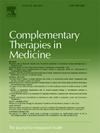Chamomile: A systematic review of adverse events
IF 3.5
3区 医学
Q1 INTEGRATIVE & COMPLEMENTARY MEDICINE
引用次数: 0
Abstract
Background
Chamomile is a well-known plant recognized for its anti-inflammatory, antidepressant, anxiolytic, and analgesic properties. The present study aimed to systematically review the adverse events associated with chamomile as reported in human studies.
Methods
PubMed, Scopus, and Web of Science were searched for clinical trials, case-control studies, case reports, and case series published in English up to February 2024. The search utilized the following keywords: ((Chamomile or Camomile or "Chamomilla recutita" or "Matricaria chamomilla" or "Matricaria recutita"), and ("Side effect" or "adverse effect “or "complicat* or "complication")). Studies that involved chamomile under different scientific names (e.g., its other species such as Chamaemelum nobile) or in combination with other herbs were excluded (PROSPERO registration number: CRD42024520053).
Results
A total of seventy-two trials and eleven case reports were included in this review. In these trials, 2896 patients received chamomile, and 65 adverse events were reported across 10 trials. Unfortunately, the incomplete reporting of adverse events in these trials, along with the absence of any data on adverse events in 28 trials, limited the scope of our review. The most common adverse events were gastrointestinal complications and drowsiness, both of which were self-limiting and non-serious. No allergic adverse events were reported in the clinical trials; however, among the eleven case reports, six reported adverse events associated with allergic reactions to chamomile, ranging from anaphylactic reactions (in three patients) to short-lasting acute rhinitis.
Conclusions
In conclusion, data extracted from clinical trials and published case reports suggest that chamomile is generally safe when used in controlled dosages, with self-limiting minor adverse events. However, case reports indicate that allergic reactions should be taken into consideration. Furthermore, there is insufficient data regarding its safety during pregnancy and lactation.
洋甘菊:不良事件的系统回顾
洋甘菊是一种众所周知的植物,具有抗炎、抗抑郁、抗焦虑和镇痛的特性。本研究旨在系统地回顾在人体研究中报道的与洋甘菊相关的不良事件。方法检索spubmed、Scopus和Web of Science截至2024年2月发表的英文临床试验、病例对照研究、病例报告和病例系列。搜索使用了以下关键字:(洋甘菊或甘菊或“洋甘菊”或“洋甘菊”或“洋甘菊”或“洋甘菊”)和(“副作用”或“副作用”或“并发症”))。排除了涉及不同学名的洋甘菊(例如其其他物种,如Chamaemelum nobile)或与其他草药联合使用的研究(PROSPERO注册号:CRD42024520053)。结果本综述共纳入72项试验和11例病例报告。在这些试验中,2896名患者接受了洋甘菊治疗,在10项试验中报告了65起不良事件。不幸的是,这些试验中不良事件的不完整报告,以及28个试验中缺乏任何不良事件的数据,限制了我们综述的范围。最常见的不良事件是胃肠道并发症和嗜睡,这两种不良事件都是自限性的,不严重。临床试验无过敏不良事件报告;然而,在11例病例报告中,6例报告了与洋甘菊过敏反应相关的不良事件,从过敏反应(3例)到短期急性鼻炎。结论:从临床试验和已发表的病例报告中提取的数据表明,在控制剂量的情况下,洋甘菊通常是安全的,具有自限性的轻微不良事件。然而,病例报告表明应考虑过敏反应。此外,关于其在妊娠和哺乳期的安全性的数据不足。
本文章由计算机程序翻译,如有差异,请以英文原文为准。
求助全文
约1分钟内获得全文
求助全文
来源期刊

Complementary therapies in medicine
医学-全科医学与补充医学
CiteScore
8.60
自引率
2.80%
发文量
101
审稿时长
112 days
期刊介绍:
Complementary Therapies in Medicine is an international, peer-reviewed journal that has considerable appeal to anyone who seeks objective and critical information on complementary therapies or who wishes to deepen their understanding of these approaches. It will be of particular interest to healthcare practitioners including family practitioners, complementary therapists, nurses, and physiotherapists; to academics including social scientists and CAM researchers; to healthcare managers; and to patients. Complementary Therapies in Medicine aims to publish valid, relevant and rigorous research and serious discussion articles with the main purpose of improving healthcare.
 求助内容:
求助内容: 应助结果提醒方式:
应助结果提醒方式:


